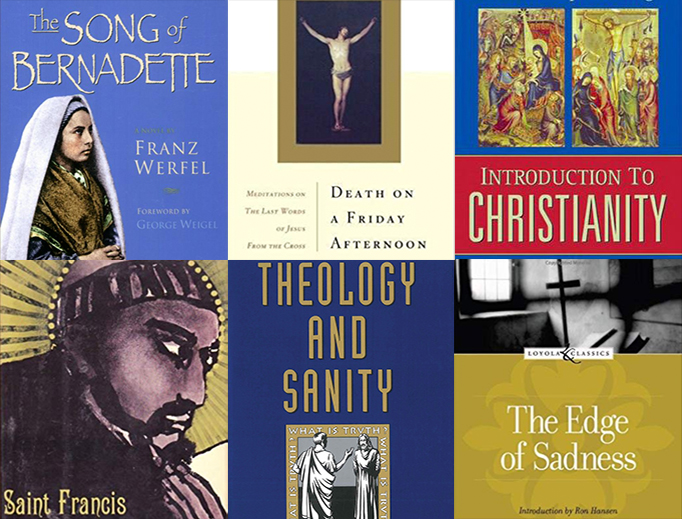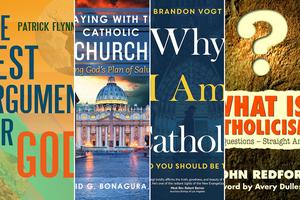Favorite Catholic Books From My Library
Modern classics from Father Richard Neuhaus, Nikos Kazantzakis, Frank Sheed and others

I am like a sponge. When I discover something new, I soak it up greedily. I began collecting all sorts of books on the faith leading up to my conversion to Catholicism, and that accelerated once I entered the Church.
I have read many of these books several times. To me, they are a treasure.
I will start with the titles of my pre-conversion phase.
Death on a Friday Afternoon — Meditations on the Last Words of Jesus From the Cross, by the late Father Richard Neuhaus, the founder of First Things magazine, I bought while visiting family in Ottawa.
I did not know who Father Neuhaus was nor did I know what the book was about, but I was drawn in by the cover art, Francisco Goya’s Cristo Crocifisso, a stunning depiction of the crucifixion in black, brown and gold.
Father Neuhaus’ theme is that we should think of every day as Good Friday. It is the event he calls the “axis mundi,” “the center upon which the cosmos turns.” Each chapter explores each of the seven things Christ said as he was dying, as reported in the Gospels. If there is any justice, it will go down the ages as a great spiritual classic.
When I finished, all I kept thinking was: “You must become a Catholic.”
I love fiction. I think great novels can often convey the essence of the faith, its pure beauty, even more than many theological or spiritual works. I would like to mention a few.
The first is Saint Francis by Nikos Kazantzakis. I should point out that before reading this I had read nonfiction accounts of the great saint. They were good but never came close to Kazantzakis’ fictional telling. The straight-up biographies gave me an appreciation for his teachings and his bravery. But Kazantzakis’ work pulled at my heart. It made me fall in love with St. Francis. And when I entered the Church I took Francis as confirmation name.
The second is a far different book. The Edge of Sadness, winner of the Pulitzer Prize for fiction in 1962, was written by American author Edwin O’Connor. The story revolves around Father Hugh Kennedy — a true hero in the common sense of the word — and the holiness of everyday struggle.
We meet him in his hometown, after drying out in a clinic for alcoholic priests. Before his breakdown, Father Kennedy presided over the most desirable parish in the city. Now, back for his second chance, he is given the most undesirable parish in the city. He notes that after his first sermon most of his very small congregation does not speak a word of English. His associate priest drives him crazy with his boyish enthusiasm. The book is at once moving and, at times, very funny.
A friend who I loaned the book said she cried at the end because she would “never see the characters again.”
The Song of Bernadette surprised me because I thought it was written for children. It is anything but. Austrian Jewish author Franz Werfel learned about Bernadette while hiding in Lourdes as he ran from the Nazis. Though fiction, it is true to the saint’s story. I just finished my fourth reading.
Once I had converted I decided to firm up my knowledge of the faith.
To really try to get a handle on some of the more complicated Catholic beliefs, especially the Trinity and what really happens at Mass, there is no better book than Theology for Beginners by Frank Sheed. What amazed me is that it plums great depth using plain English. It shines with clarity. However, to really appreciate it, you cannot read it in a rush. Sheed even advises stopping at certain point, thinking about what you have learned, and then reading again. There is a sort of part two to this book called Theology and Sanity. It is essentially the same book but expanded.
Finally, there is Cardinal Joseph Ratzinger’s Introduction to Christianity. Unfortunately, the title is badly misleading. I tried reading it years ago and was taken aback. But then I realized it is not really an introduction. If you are new to the faith, I would wait a few years to tackle it. But it was worth the wait. It is also a reminder of Pope Benedict’s genius.
Charles Lewis writes from Toronto.
















